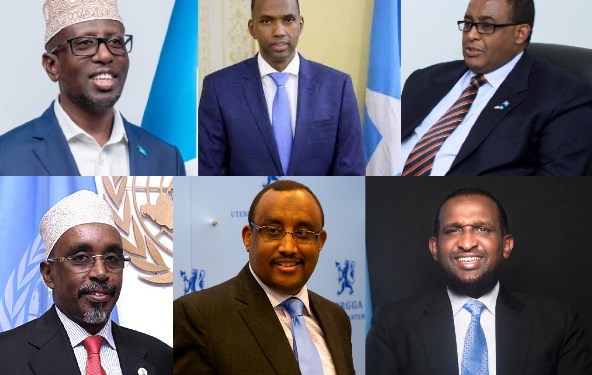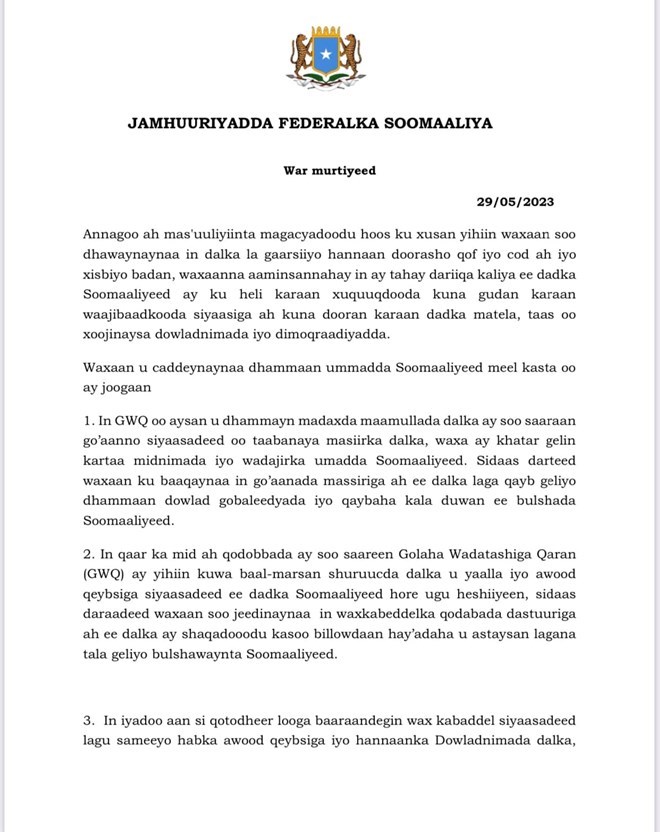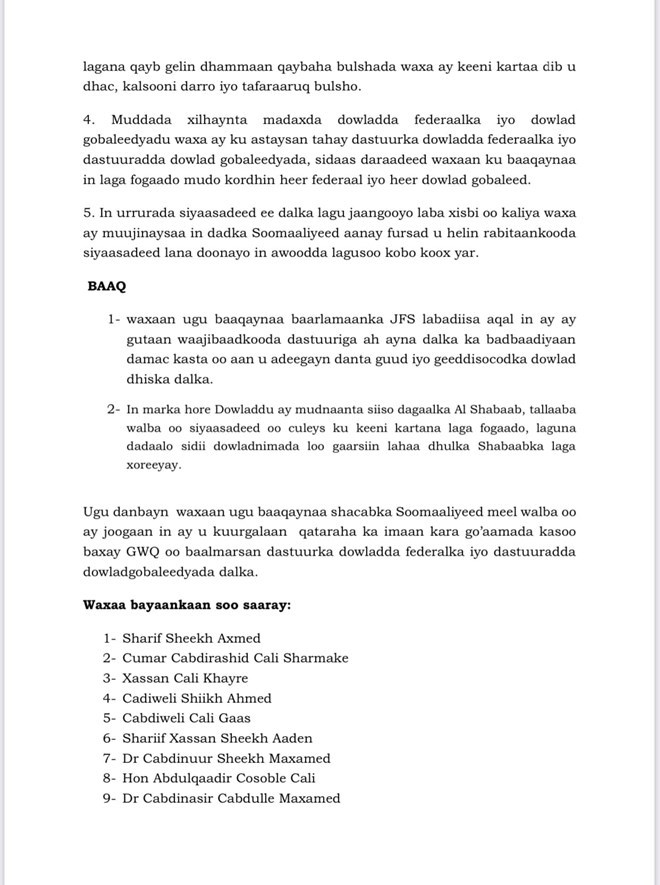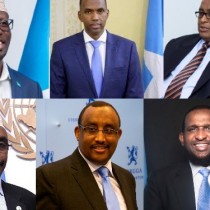
Political leaders oppose NCC's election agreement; Farmaajo stands alone in supporting decisions
..

The politicians argue that several provisions issued by the National Consultative Council violate the country's laws and the existing power-sharing agreement that the Somali people have previously endorsed. They urge regional and federal leaders to initiate the process of amending the constitutional articles through the designated constitutional institutions.
A particular point of contention is the term extension for the heads of the federal and regional governments. The joint communiqué calls on leaders to refrain from extending their terms beyond what is stipulated in the federal and regional government constitutions. According to the politicians, this extension would undermine the principles of governance and political fairness.
Furthermore, the joint communiqué emphasizes the concern that only two parties dominate the country's political landscape. This limited scope of political representation denies the Somali people the opportunity to express their political will and concentrates power within a small group.
In light of these issues, the politicians appeal to the country's leaders to prioritize the fight against Al Shabaab, avoiding any political measures that may impede progress. They also urge the leaders to extend governance systems to the liberated areas and call upon both chambers of parliament to safeguard the nation.
In contrast, former President Mohamed Abdullahi Farmajo has voiced his support for the decisions of the National Consultative Council meeting, particularly regarding the country's elections. In a statement posted on Facebook, Farmajo welcomed the electoral agreement establishing a one-person-one-vote system, ensuring the direct election of a president and vice president.
As part of the reshaping of Somalia's political architecture, the leaders of the Council also endorsed eliminating the Prime Minister's role in favor of a presidential system. This shift aims to enable citizens to directly elect the President and Vice President on a singular ticket. The current presidential term is set to conclude in May 2026; however, the communiqué did not address the transition beyond this point.
"We welcome the agreement reached by the leaders of the National Consultative Council on 27/5/2023, especially the matters concerning the local, state, and federal elections, where the people will directly elect their representatives—a long-awaited goal for the Somali people in the multi-party system," stated former President Mohamed Abdullahi Farmajo.
Under the agreement, Somalia will transition from indirect voting to direct voting, marking a pivotal shift in the nation's electoral process. After enduring three decades of conflict and clan disputes, Somalia is poised to elect its president and other officials through direct popular vote starting next year.
A 15-member national election and border committee will be formed to manage all local, regional and federal elections.
As the political landscape in Somalia continues to evolve, divisions among senior politicians persist regarding the decisions made during the National Consultative Council meeting. The nation faces critical challenges in navigating constitutional amendments, power-sharing arrangements, and the transition to direct voting, all of which will shape the future governance of Somalia.

 A group of prominent politicians, including a former President and Prime Ministers, has opposed the decisions made during the recently concluded National Consultative Council meeting.
A group of prominent politicians, including a former President and Prime Ministers, has opposed the decisions made during the recently concluded National Consultative Council meeting.
In a joint communiqué released on Monday, former President Sheikh Sharif Sheikh Ahmed, former Prime Ministers Omar Abdirashid Sharmarke, Hassan Ali Kheire, Abdiwali Ali Gaas, former South West President Sharif Hassan Sheikh Adan, and Dr. Abdinur Sheikh Mohamed, Hon Abdukhadir Osoble, and Dr. Abdinur Abdulle Mohamed highlighted concerns that the Council's decisions could potentially jeopardize the unity of the Somali nation.
advertisements
A particular point of contention is the term extension for the heads of the federal and regional governments. The joint communiqué calls on leaders to refrain from extending their terms beyond what is stipulated in the federal and regional government constitutions. According to the politicians, this extension would undermine the principles of governance and political fairness.
Furthermore, the joint communiqué emphasizes the concern that only two parties dominate the country's political landscape. This limited scope of political representation denies the Somali people the opportunity to express their political will and concentrates power within a small group.
In light of these issues, the politicians appeal to the country's leaders to prioritize the fight against Al Shabaab, avoiding any political measures that may impede progress. They also urge the leaders to extend governance systems to the liberated areas and call upon both chambers of parliament to safeguard the nation.
In contrast, former President Mohamed Abdullahi Farmajo has voiced his support for the decisions of the National Consultative Council meeting, particularly regarding the country's elections. In a statement posted on Facebook, Farmajo welcomed the electoral agreement establishing a one-person-one-vote system, ensuring the direct election of a president and vice president.
As part of the reshaping of Somalia's political architecture, the leaders of the Council also endorsed eliminating the Prime Minister's role in favor of a presidential system. This shift aims to enable citizens to directly elect the President and Vice President on a singular ticket. The current presidential term is set to conclude in May 2026; however, the communiqué did not address the transition beyond this point.
"We welcome the agreement reached by the leaders of the National Consultative Council on 27/5/2023, especially the matters concerning the local, state, and federal elections, where the people will directly elect their representatives—a long-awaited goal for the Somali people in the multi-party system," stated former President Mohamed Abdullahi Farmajo.
Under the agreement, Somalia will transition from indirect voting to direct voting, marking a pivotal shift in the nation's electoral process. After enduring three decades of conflict and clan disputes, Somalia is poised to elect its president and other officials through direct popular vote starting next year.
A 15-member national election and border committee will be formed to manage all local, regional and federal elections.
As the political landscape in Somalia continues to evolve, divisions among senior politicians persist regarding the decisions made during the National Consultative Council meeting. The nation faces critical challenges in navigating constitutional amendments, power-sharing arrangements, and the transition to direct voting, all of which will shape the future governance of Somalia.


SOURCE:-HIIRAAN.COM



 0
0 







Political leaders oppose NCC's election agreement; Farmaajo stands alone in supporting decisions
..